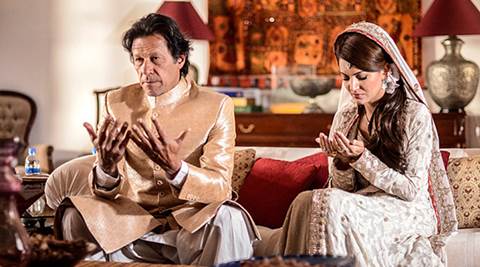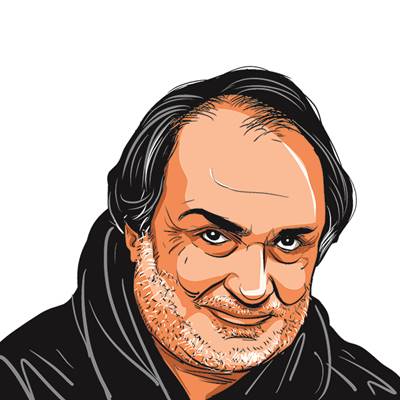Opinion A Little Bit Of Magic
Imran Khan is a politician with a sense of personal destiny, and a divine mission

 Nearly 10 months after Imran Khan tied the knot with TV journalist Reham, his second marriage has ended in divorce. (Source: PTI file photo)
Nearly 10 months after Imran Khan tied the knot with TV journalist Reham, his second marriage has ended in divorce. (Source: PTI file photo)
Reham Khan arrived on the scene in Pakistan in 2014 as a TV reporter. Her name was spelt funny in Urdu. She didn’t bother to clarify, so it was written with a big Urdu “h” rather the small Urdu “h”. It meant “uterus” when misspelled. But when spelt with a small “h”, it meant “light drizzle”. She was beautiful; and interviewee Imran Khan fell for her, married her, only to divorce her 10 months later — a second divorce for both. Her first husband is a psychiatrist in London. What began as magic, she says now, turned out to be black magic.
The Express Tribune wrote on November 15 about black magic being one possible reason for Reham’s divorce: “In the weeks before their divorce, Reham claims she found ‘things emerging in the house’. She said she doesn’t know what those ‘small things’ [talismans called taveezes] were but the servants said she shouldn’t be touching them. Reham earlier hinted at ‘black magic’ being the cause of their split and this is what she is said to have referred to.”
Imran’s first wife, Jemima, was a rich woman, financially secure, shy by nature, socially withdrawn, and tolerant of Imran’s spirituality. Reham was just the opposite: Assertive, constantly on the lookout for a good chance, and less tolerant of what she thought was black magic practised in Imran’s house.
In a book Imran wrote, Pakistan: A Personal History, he talks about his strong sense of personal destiny, revealed through soothsayers. He recalls: “Pir Gi from Sahiwal said I would be very famous and make my mother a household name”. Imran had announced his first retirement when he met another clairvoyant: “Baba Chala lived in a little village just a few miles from the Indian border. He certainly had not heard about my retirement… The man looked at me and said I had not left my profession…It is the will of Allah; you are still in the game”.
But the man who stood by him as his spiritual mentor and crystal-gazer was Mian Bashir, who shocked him by naming the Quranic verse his mother used to read to him as a baby and predicted that Allah had “turned the tables” in his favour in the libel suit two English cricketers, Allan Lamb and Ian Botham, had brought against him. From his sense of predestination comes his risk-taking character.
Imran married Jemima in 1995 but the marriage was soon on the rocks. He is graceful in his expression of sincere regret at what happened: “The six months leading up to our divorce and the six months after made up the hardest year of my life”. If the book is a personal narrative, Jemima probably deserved more space. She was of far greater personal worth than he realised, although he is appropriately grateful that his two wonderful sons are growing up with her in England, away from the violent dystopia of Pakistan.
Imran’s last known spiritual guide was Ahmad Rafique Akhtar of the city of Gujar Khan. Akhtar reportedly used to decipher people’s fate from their names. Reham complains that Imran insistently enquired from her the full names of her parents. She may have mistaken this for black magic. There are reports that Imran is no longer a devotee of the “oracle” of Gujar Khan. In fact, Akhtar has been reported as saying very negative things about Imran after the spiritual break-up.
Jemima told Vanity Fair why she left Imran in 2004: “The billionaire’s girl and her two children are frequently ill with stomach complaints while her husband is ‘practically penniless’ and frequently away from home pursuing a political career. Jemima and the couple’s two children — Sulaiman and Kasim — have suffered from tummy bugs in their previous [Islamabad] home, which had peeling paint, grimy furniture and power cuts.”
I am a supporter of Imran because he is uncorrupt in a financially corrupt society. He has built a charity cancer hospital of international standard in Lahore where the poor are treated for free. He has built a university in backward Mianwali, his father’s native town, and is about to open another charity hospital in Peshawar. The young like a tough-talking, full-time denunciatory leader. But the “divine mission” for which he makes domestic sacrifices may ultimately turn out to just be politics.





